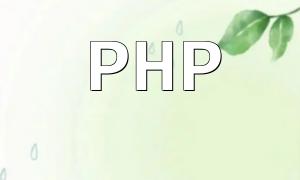PHP is a widely used server-side scripting language, primarily designed for developing web applications. In recent years, the PHP community has consistently improved the language’s security and defense capabilities. PHP 8 introduces many new features that enable developers to enhance security and defense capabilities through code. This article will introduce key new features in PHP 8 and demonstrate how to utilize them to improve security.
PHP 8 introduces a stricter type-checking mechanism. Developers can use type declarations in function and method signatures to ensure that parameters and return values match the expected types. This prevents common type-related errors and improves the readability and maintainability of the code. For example:
function divide(float $a, float $b): float {
return $a / $b;
}
In this example, by restricting the types of parameters $a and $b to float, we ensure that only floating-point numbers are passed to the `divide` function. If other types are passed, PHP will throw a type error at runtime.
PHP 8 introduces a new Null safety operator “?->”. This operator allows developers to access properties or methods of objects that might be null without triggering errors. For example:
$user = getUser();
$name = $user?->getName();
In this example, if the `getUser()` function returns null, the value of `$name` will be null, and no error will occur. The Null safety operator simplifies the code and increases the robustness of the program.
PHP 8 introduces the concept of final classes. A final class cannot be extended, which helps prevent other developers from modifying or extending the original class behavior. By declaring a class as final, you can protect core logic or sensitive data. For example:
final class DatabaseConnection {
// class implementation...
}
In the example above, the `DatabaseConnection` class is declared as `final`, meaning it cannot be inherited. This prevents malicious class extensions or method overrides, thus enhancing the class's security.
PHP 8 allows developers to use expressions when defining constants. This enables the calculation and determination of constant values during coding rather than at runtime. For example:
const TAX_RATE = 0.15;
const MAX_AMOUNT = 100 * TAX_RATE;
In this case, the value of the `MAX_AMOUNT` constant is calculated during coding through an expression. This reduces the runtime calculation overhead while improving the readability of the code.
Besides the new features in PHP 8, developers can further enhance application security and defense capabilities by following best practices, such as:
PHP 8 introduces several new features that significantly enhance code security and defense capabilities. By using strict type checking, the Null safety operator, final classes, and constant expressions, developers can build more secure and reliable PHP applications. Additionally, following best practices like using prepared statements, validating inputs, implementing authentication mechanisms, and keeping the PHP version up to date will further strengthen the security of applications.









